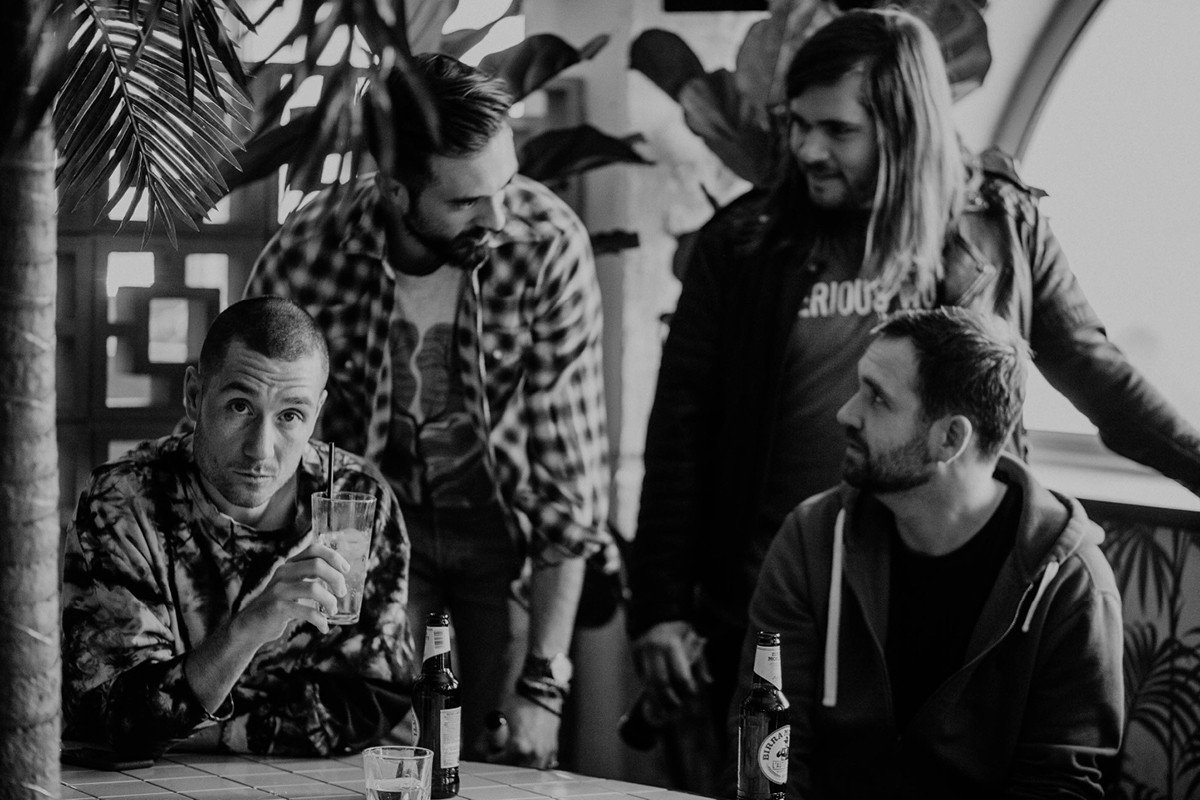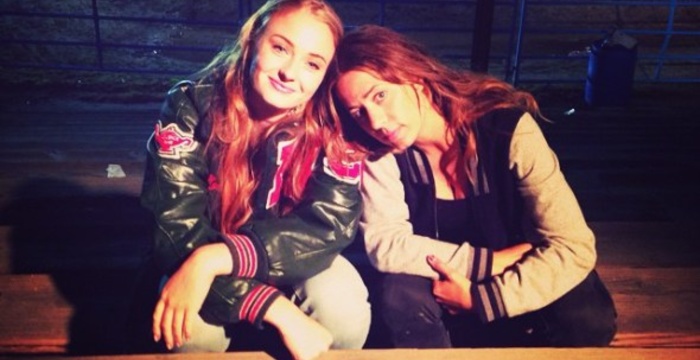Interview: Bastille - finding joy in dark times.
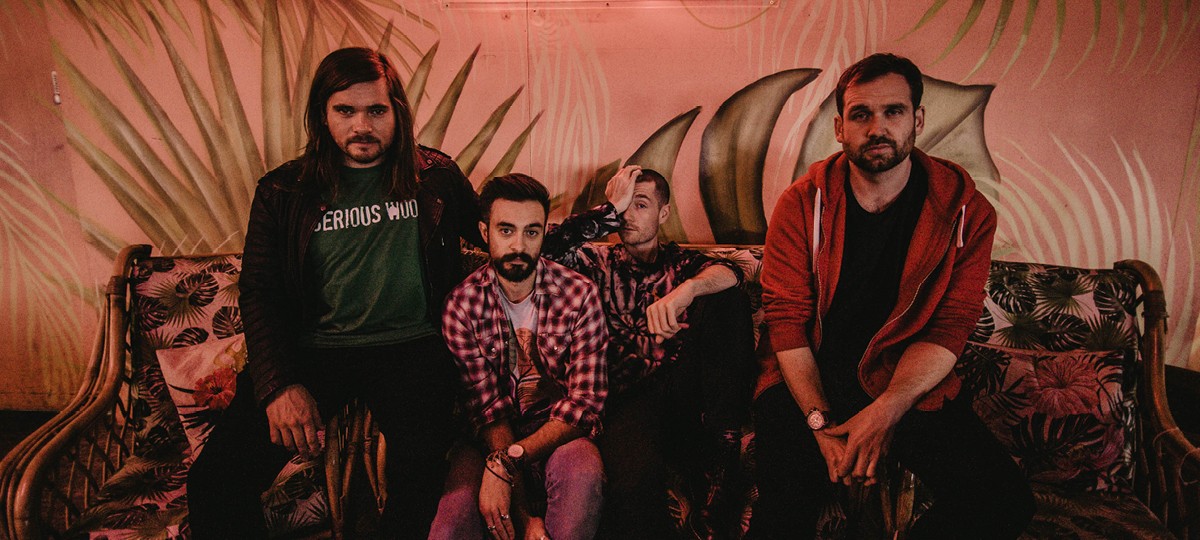
Bastille’s frontman Dan Smith is midway through examining a Coup De Main zine that I’ve handed him, turning it into a show and tell session, and explaining to the rest of the band what it involves for them: “So, we’re all going to take a polaroid, a headshot polaroid, and everyone has to do a drawing of themselves.” Smith’s jet-lag might be at an all-time high after arriving in Melbourne the night prior to playing their first show of the year, but he’s pushing through it.
I meet all four members of the band for the first time inside a cozy dressing room at Sydney’s Luna Park where their second show of the year is due to happen, and the jokes start within minutes of being in their company, with bassist Will Farquarson dryly asking me: “Don’t you just hate it when people you’ve just met start complaining about their jet lag?”
As if the jet lag alone wasn’t enough to cause confusion, when we take the band outdoors, a group of fully costumed clowns join the party, who also then join the impromptu photoshoot, much to the band’s delight:
Having dropped the fourth edition of their ‘Other People’s Heartache’ mixtape late last year, Bastille gave lead single ‘Grip’ its live debut on that Australian mini-tour, whilst also simultaneously multitasking to finish what is ‘Doom Days’, the band’s third album, which is now set for release this month on June 14th.
That trip actually helped to complete the album, Smith tells me a few months later on a FaceTime call, sharing that the lyrics to the title track suddenly came pouring out of him at that time, with a sense of urgency. Listen to ‘Doom Days’ and you’ll hear that urgency, with lyrics like, “Think I’m addicted to my phone / My scrolling horror show,” feeling particularly apt in 2019.
Three albums in, and three years since their last album ‘Wild World’, Bastille have taken their time in crafting a new album which not only speaks to the world we live in today, but takes their signature layered sounds and pushes them in whole new directions - from different vocalists popping up on songs throughout the album (Smith likes to think of them as characters in the story of the night), to samples of Russian musicians (Igor Grigoriev’s voice appears at the end of the infectious ‘Nocturnal Animals’).
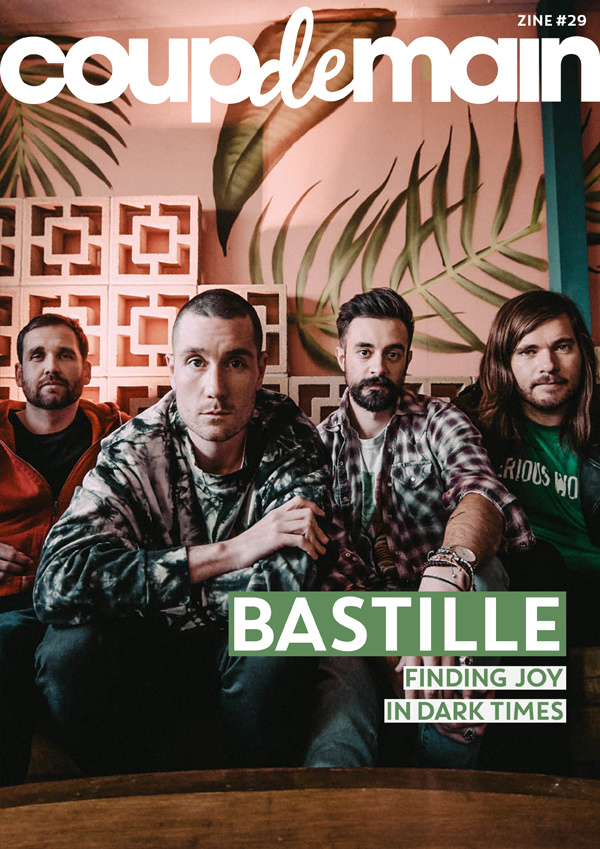
Click here to order a CDM x Bastille zine (i.e. a mini-magazine featuring photos + quotes from this interview).
Despite the important real-life political notes that the album touches on, with songs like ‘Million Pieces’ exploring a party discussion turning political, Smith still wants listeners to come away with a feeling of hope, which the latest single ‘Joy’ exemplifies. It closes out the album as the morning after (it’s time-stamped as 08:34 am), and sees Smith celebrating positivity - he sings, “You're a sweet relief, you saved me from my brain.” Smith tells me more about about this contrast in their music, saying, “Our music has a lot of darkness and anxiety in it, but I also think it’s important that there’s a glimmer of hope and optimism in everything so it doesn’t get too self-serious or bogged down in any of that stuff.”
One of the most powerful moments on the album comes in ‘Divide’, where Smith asks, “Why would we divide when we could come together?” It’s a simple question, but maybe one that we should all be thinking more about. In a world where division seems so much closer to reality than unity, it’s songs and albums like ‘Doom Days’ that provide a glimpse of human connection, and might just inspire it.
We spoke with Bastille several times over the last few months about their upcoming album ‘Doom Days’, the state of the world - and the below is a compilation of those conversations…
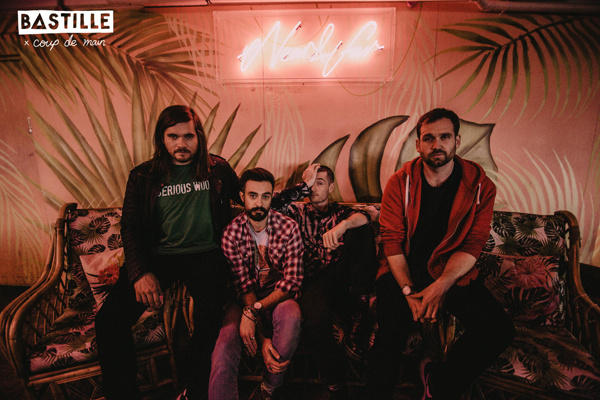
COUP DE MAIN: How have you guys been?
BASTILLE - DAN SMITH: We’ve been good! Since we saw you, we've finished the album, we went on tour all over the UK and Europe, and we did this whole different tour thing that we did lots of visuals for, which was really fun.
CDM: I saw some videos, it looked really cool.
DAN: Yeah, I was really happy with it. We wanted to basically tour the concept of the album without being able to play any of the music. <laughs> So we put together the three stages of a night and sort of premiered a new song and tried to make it slightly weird and theatrical in the sense that we wanted to make the stage feel like a room. We wanted to use sparse bits of furniture and stuff to make it be transportive, rather than a play. That was fun - there were lots of projections and I loved it. Thinking of a tour as a self-contained one-off thing, it’s almost like making an album in that you put all this work into staging something and doing all these visuals and you know that it will happen for a month and a half and then never again, which is quite fun.
CDM: It’s a cool way to introduce people to the album and the concept as well, through the stage.
DAN: Yeah totally - I hope that it seeded a bunch of ideas that people will then hear in more detail on the record. It was really fun. I also just ran the London Marathon on Sunday - I’m not an athlete, I’m not a runner, I’m the most uncoordinated, ungraceful, buck-kneed, stumbler-arounder in the world, so the idea of me doing a marathon was interesting. But it’s been really fun, touring, shooting loads of videos, getting the album done and then just these weirdly long running interludes in and amongst it all that I was not expecting.

CDM: When did you start coming up with the ideas and thoughts that eventually became the first parts of ‘Doom Days’?
BASTILLE - CHRIS WOOD: Dan just never really stops writing.
CDM: Did you have a break at all?
CHRIS: We had a break from touring!
DAN: We stopped at the end of the year before last. We spent the first couple months of 2018 in London. I guess the ideas for it came when we were touring the last album. Our second album was about being confused by and trying to get your head around the sizeable changes in the world - the election of Trump… and I guess it’s easy to feel like the news is quite a bizarre and terrifying thing to watch and you can choose to turn it off, or you can choose to go down the rabbit hole of it. We started releasing our last album on the eve of Brexit in the UK, and Trump’s election in America, and all it was sort of on the eve of this bizarre, populist, right-swinging trend that seemed to have happened in a lot of countries. The album was about just trying to get your head around stuff - growing up, being in the world, realising the world is a bizarre and complicated place and that life is a weird thing. Then we toured it and we played the songs every night and the production we had was quite over the top, well, not over the top, I loved it, but it heightened all the themes of the album. We played at one point at a festival in Germany and we had a giant Theresa May in drag behind us singing along to a song called 'Fake It' - it wasn’t subtle. We were playing at this festival in Germany-- actually we didn’t get to play because there was a terror threat and all 80,000 people at the festival were evacuated including us and the next night we played the festival with this huge production behind us in this show that was kind of dark and critical of a lot of politics. We had this realisation that we make music because we love it, and as music fans, I think we go to festivals to not think about stuff that’s in the news and politics. That’s rammed down our throats all the time.
CDM: Also people find their news on the internet and on social media, and you can’t really escape it now.
DAN: It’s so inescapable. I’ll get a buzz on my phone and be like, 'Oh, I got a message!' And it’ll be like 'BBC News alert: something awful just happened somewhere.' I guess you can choose how engaged you want to be or not. But at that festival, we just thought, the space of a festival or a gig is one where you’re not coming to be constantly reminded that the world is fucked. I think music and art and everything is a form of escapism, and I’m not saying that it shouldn’t offer commentary or engage with stuff, but I think for us we just felt like we wanted to engage in escapism a little bit. That’s where the idea of that album came from. The first few songs came from that, and then the idea of the story of the album came around and it became a bit of a snapshot of where my head was at about a year or so ago.
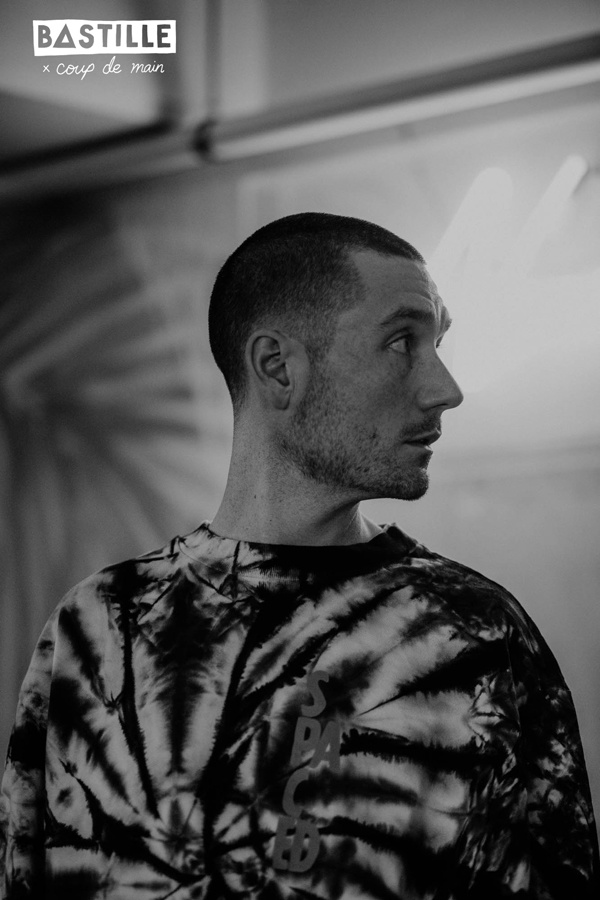
CDM: So we’re in the month of May which is halfway through the year. How are you feeling about the state of 2019 so far?
DAN: Oh my god. Good question. I mean, it kind of feels like slightly more of the same, unfortunately.
CDM: I feel like going through 2018, everyone was like, ‘It couldn’t possibly get worse than 2018 right?!’ But here we are.
DAN: Here we are indeed. There’s just been another huge, horrific terrorist incident, the world’s politics are still shifting madly to the right, and it still feels like an increasingly bizarre place to live in. But I think there’s positive stuff - like there being these Extinction Rebellion protests in London and a lot of talk about climate change. I think a thing to take heart from is despite the confusion and negativity coming from some people, there’s a lot of positivity being galvanised in opposition to that, and you’ve just got to hope that that tide, that wave will just grow and grow and grow, and that things will hopefully shift the other way. For me, things like London being shut down by people who’ve had enough of climate change being ignored, it provoked a conversation amongst people who sometimes refuse to have it and hopefully that will effect change. Seeing someone like Greta [Thunberg, 16-year-old climate change activist] being all over the news and standing for something at such a young age and being on the autistic spectrum and saying something so powerful on the international stage is kind of amazing. And then seeing these awful, older journalists just bitchily try and take her down, it’s just such an interesting story of a young idealist who will face the future that this older generation has laid out, and has to live in it, just being totally dismissed by the old-school establishment who are showing themselves to be a bit pathetic.
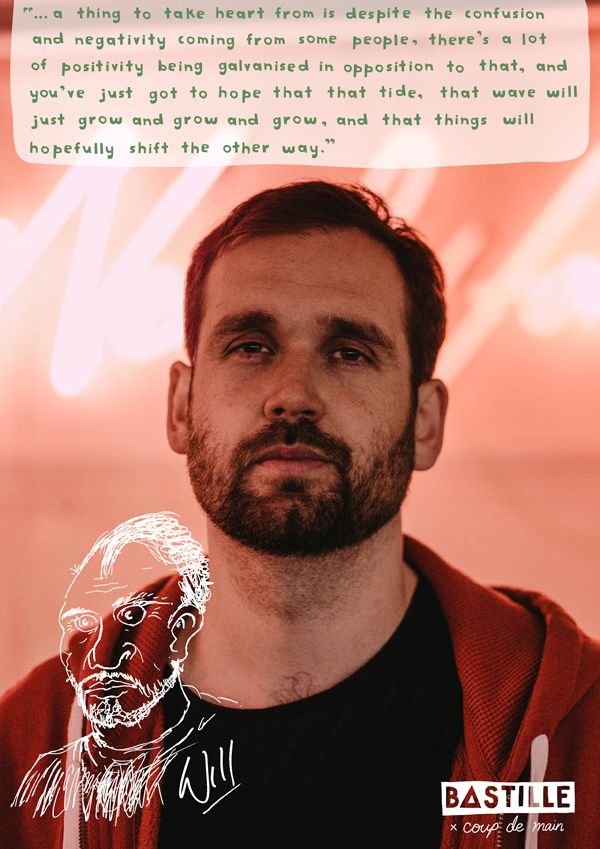
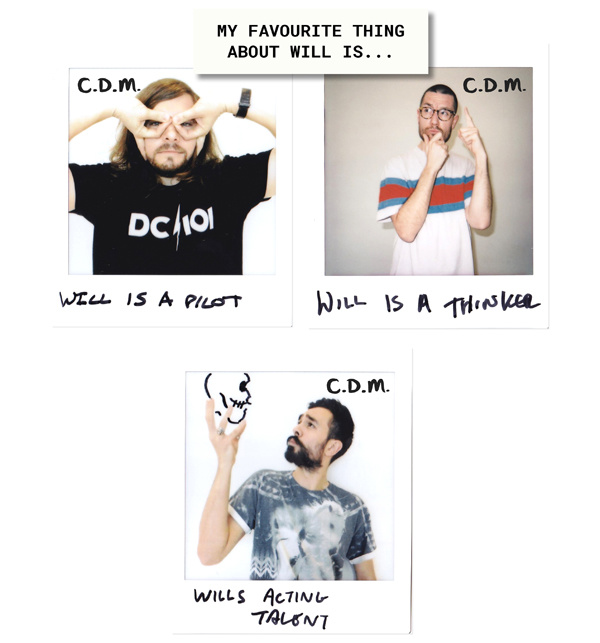
CDM: In the album’s title track, 'Doom Days', you say, "We'll stay offline so no one gets hurt." In a world where we’re constantly online and surrounded by so much news and hatred, is it important to have times offline sometimes?
DAN: Totally. I mean, it would be hypocritical to not admit that I use my phone and the internet all the time, it’s such a huge part of our lives. I think the point of the album and the point of that song is about trying to keep perspective and unplugging, and moderation. Not to labour the point, but in doing the marathon this weekend it was good for me to have something on the horizon for a while that was a slightly insurmountable task in my head to work towards that had nothing to do with music because I can get a bit over-obsessed down the rabbit hole of music because I love it so much. It was just really fun to have this marathon thing, and then to eventually do it. It was so surreal doing this mad, long run through London in this packed crowd of people all about to run 26 miles. The streets of London are shut down, and they’re lined with people who are cheering everybody on - so many people are there just to support their friends and support family members and to represent charities. When I was doing it, I was alongside my friend and we were trying to chat, but we were both fucking knackered - at one point I couldn’t help thinking as people are shouting out and heckling, but all positive stuff, it felt like the antithesis to the internet in some ways. I was like, ‘Here are people on the streets, all alongside each other, with each other, complete strangers, just shouting positive things at each other…’
CDM: Literally the opposite of the internet!
DAN: Yeah, it was like a sort of antithetic parody of what the internet is, in a really nice way, and I couldn’t help but smile a little bit - smile through the pain of 26 miles of hobbling! I couldn’t help but think, ‘Oh this is so nice, it’s such a lovely antidote to it,' in some ways. These are really weird times where something like Facebook which was something that was started to share drunk night-out photos with your university friends when it first started has become something that sways elections. That’s just the sort of speed of change and how madly it’s developed. Obviously there are so many amazing positives to what it offers and it’s easy to see it as completely negative and I don’t want to, so I guess that the song was meant to - it speaks for itself, but - be kind of self-skewering, a bit of a piss-take at the same time as saying things that we really feel.
CDM: "I'm live-streaming the final days of Rome," is such an apt lyric - really bleak but really accurate. What do you think the future of the relationship between society and technology will be like?
DAN: I’ve got no idea! I went to see Ian McEwan talk about his new book, which is a kind of sci-fi from his perceptive, it’s set in the 70s and 80s but in a slightly different version of reality in the UK where different things occurred. It’s about the first realistic robots, but he’s obviously thought a lot about technology and our relationship with it, and he was saying that there’s a thing at the moment with parents who’ve got little kids who are interacting with Siri and Alexa and there’s this big debate as to whether or not kids should be saying "thank you" and "please" to Alexa, and if it’s engendering a culture of treating technology... if they’re not human, should you be polite to them? Do they deserve a please or thank you? If that’s potentially creating a culture of, I don’t know, technological slavery, fuck knows, it’s interesting and he’s a much smarter guy than I am. But it does bring in the question of how it’s going to develop and where does it go? It’s interesting reading all that stuff recently in the news about people’s conversations with Alexa being transcribed. <laughs> It feels like fiction in the not-so-distant past seemed totally far-fetched and futuristic, but in some ways, it feels like we’re way beyond that now. But in other ways, we’re way behind it.
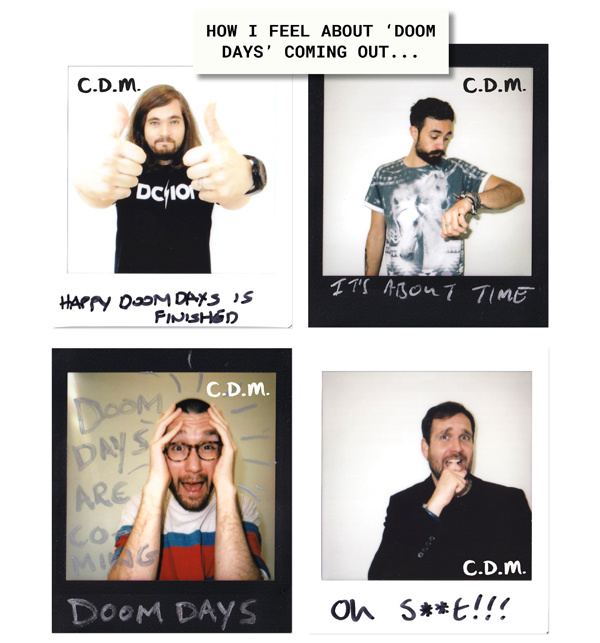
CDM: Did the album process kind of start with ‘Quarter Past Midnight’ being the first thing you came up with for that?
DAN: It wasn’t actually. 'Nocturnal Creatures' was the first tune, and then it sort of spiralled out from there a little bit. ‘Quarter Past Midnight’ came a bit later and I just wanted to try and capture different moments from a night out that were literal on one level, but kind of spoke to other things. That song I think more than any other is sort of ‘setting the scene’ as the opening track of the album. I wanted to try and capture that feeling when some people are peeling off and going home and when you’re part of that group that’s like, ‘No! The night’s not finished, it’s just starting!’ And you’re throwing yourself headfirst into the night.
CDM: Was there something specific about quarter past midnight being the time you chose? Traditionally in pop-culture, the strike of midnight is when things happen!
DAN: I think we’ve tipped beyond that point. I think with the album being called ‘Doom Days’ and the imagery of a clock, and the passing of time - but I guess it’s open to interpretation as to whether it’s a doomsday clock - that if this is an apocalyptic party, we’re beyond the point of apocalypse. I feel like at quarter past midnight, the people who are gonna go home have left by then. The album deals with that weird slightly parallel universe that seems to exist between midnight and when people wake up in the morning. It’s the world, but flipped on its head, with the things it has to offer and the things that people do. I thought it was an interesting setting for what we wanted to talk about.
CDM: Why did you want to sample Igor Grigoriev at the end of 'Nocturnal Creatures'?
DAN: The whole idea of the Russian rave culture coming out of oppression, and then this sudden freedom, I thought that was fascinating and I wanted parts of the album to feel nostalgic and nod back to rave cultures of times gone by. There’s something really interesting to me about the 90s, in the UK and also elsewhere in the world, this time where there were these raves and it was maybe politically a much more left-leaning time. Culture was blooming with music and fashion and BritArt and D-Day culture, and mobile phones didn’t really exist, and the internet wasn’t really around so everything was about word of mouth. You’d just go to these raves by dialling a number and be given longitude and latitude and you’d have to find the place and turn up in your car and follow another car into the middle of the field and there’d be this huge rave. It’s just so far from where we’re at now and that’s not a time that I really experienced at all, it was before my time, but it sounds like it would have been fucking awesome. I just love his words about the new Russia, and about the idea of having felt deprived and suddenly having it all in front of you and wanting more and more and more and just gorging on the things that are in front of you. There’s something about being an adult that’s a bit like that as well. You realise that the things that have stopped you from doing things as a kid, you now have this independence and you can kind of do what you want - there’s nothing to stop you from doing any of the things that seemed unobtainable as a child, I mean, like hedonistic stuff. I loved the way that he expressed that, and ‘Nocturnal Creatures’ the song is about that feeling of invincibility in the night-time, and feeling like you own that situation. You can keep going and you’re kind of invincible, even though obviously you’re not. I just thought he summed that up brilliantly in those words. There’s something about sampling other people’s words as well, it’s both about using what they’ve said and also putting it in different contexts. It goes both ways and it can really help the tone of the song.
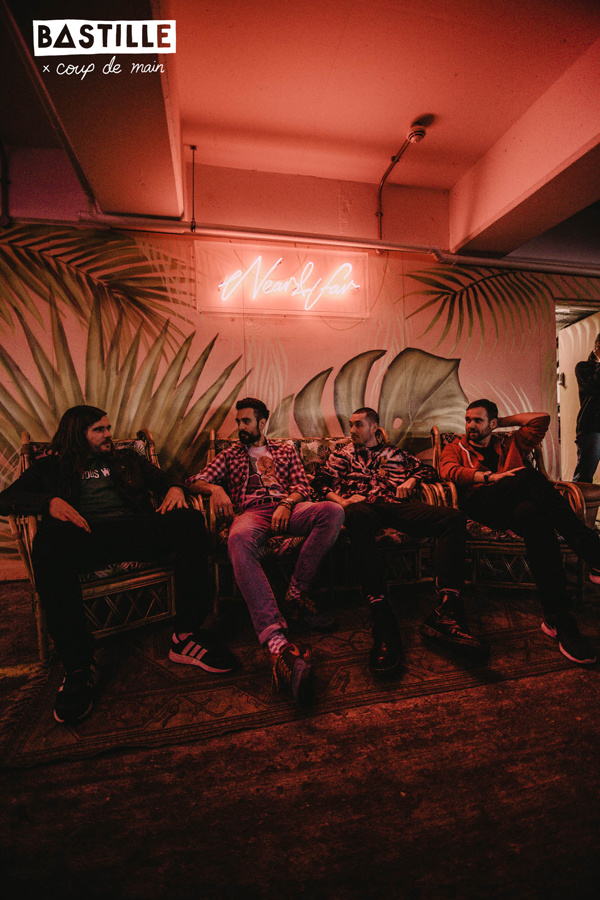
CDM: At the Summer Sessions you called the album "an apocalyptic album about sorting out all the bullshit in your life." Did you find yourself pulling from your own life experiences more when writing this album? Or was it a mixture of this and other things happening around you?
DAN: I think it’s definitely quite personal. But I also wanted to use the night out and use the breakdown of a relationship as a metaphor for a lot of other things as well. Having set out to make an album that was trying to talk about the importance of escapism and how particularly these days it feels important to disengage at some point and not be constantly engaged because it can just really fuck with your head, but equally, that’s not saying that you should totally disengage the whole time. But when it comes to escapism, hedonism can obviously go from a point where it tips from healthy into really unhealthy.
CDM: Like if you’re disconnected from reality?
DAN: The idea of 'blowing off steam', it’s perceived to be a good thing and I’m sure it can be in some situations, but equally if you blow off too much steam, or if you continue to blow off steam for a long time - to horribly extend my metaphor - it can be a bad thing.
BASTILLE - KYLE SIMMONS: You run out of steam.
CDM: There is a finite amount of steam!
DAN: <laughs>
CDM: It’s like a kettle!
DAN: You’ve got to reboil the kettle, guys!
CDM: You also said that you wanted the album to feel more intimate. How did you go about creating that feeling?
DAN: The album has got a very cohesive sound, and I think it feels quite intimate, both lyrically and socially. The whole 'apocalyptic party' label for the record is quite fitting because there are moments that are massive and really euphoric and often dealing with slightly weird topics. <laughs>
KYLE: Sonically, it’s moved away a bit from your classic Bastille with walls of vocals and often big epic strings all the time. Sometimes we would end up with backing vocals on every song; now it’s not every song, it’s a lot more exposed I guess.
DAN: 'Quarter Past Midnight' is probably the song on the whole album that sounds the most like us. The rest of it goes off on some pretty strange tangents. I always feel weird talking about lyric and song topics and stuff, but I think when you hear it properly, it feels like it’s about the decay of a relationship, the desire for distraction and to be temporarily taken out of your own life, the problems in your own life that are small and personal, but also the ones that are way bigger than you can comprehend and you can’t really affect any change to, and then about a sort of slightly self-destructive nihilist charging into the night and the search for a human connection. We tried to use different points of a night, of people peeling off and leaving and you not wanting your friends to leave, that moment of being really loved up halfway through the night and just wanting to be around people, and friendships, and moments of people trying to talk to you about serious political topics at a party when they’re off their face and you’re like, ‘Ugh, please can we not talk about this now! I’m not saying it’s not important, but let’s talk about it tomorrow?’ It was just trying to sort of capture all of those things. And having a one night stand, and all these different sort of tropes, because they’re real and they happen, and we wanted to thread them through this slightly trippy experience of the night, and also to address the worries and concerns that everyone has about their relationships with each other and their phones and the internet and with the worries of just being a person who exists in 2019. I think with a lot of our music, it always feels like it’s on the knife's edge between joy and despair.
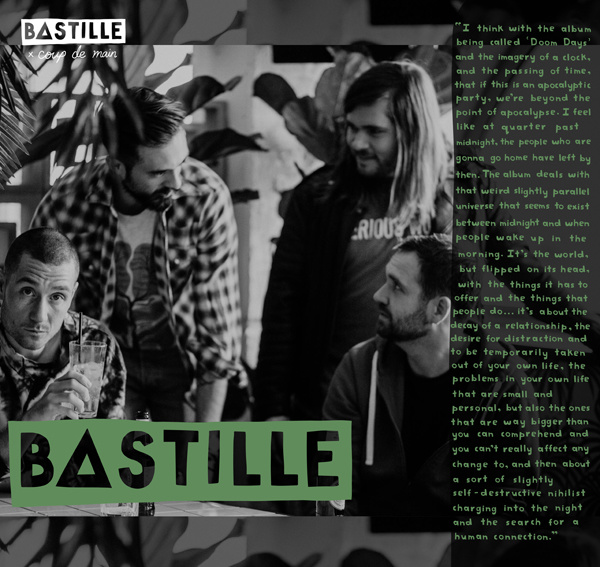
CDM: Was ‘Million Pieces’ based on an experience you had yourself at a party? What was running through your mind while writing it?
DAN: I wanted to tell the story of someone who’s trying to come up and forget everything, being dragged back down from the ceiling by the reality of things. There’s always that person at the party who really wants to talk about something really serious, and sometimes there’s space for that conversation, sometimes that’s completely appropriate and there’s space for it, but other times there isn’t and that’s what you’re trying to avoid. I think that song embodies what we talked about in terms of our last album being quite bleak in some ways and anxious about how to react to all these changes. The tour that we then took out from that album which really hammered home those points and was quite critical of news, media, and the direction that politics was heading in, I think it was good for us to do something that we felt passionately about, but I think there were certain points when we were playing that show at festivals and not that people weren’t enjoying it - it felt good - but I would look behind me and see a giant Theresa May in drag screaming about faking it and I couldn’t help but think that maybe people at festivals just don’t want to be thinking about that. <laughs>
CDM: It’s hard because I feel like there needs to be a balance between knowledge and ignorance of what’s going on in the world and it’s hard to know where and when is the correct place to talk about those things.
DAN: It’s really hard. I have a real issue with people who will say to musicians or artists in any kind of capacity, ‘Shut up, stick to your job and don’t talk about politics!’ I think that’s a ridiculous thing to say and there’s a long history of music and pop music having a voice of protest and being critical of society. That’s always been the job of the arts, to hold a mirror up to society and politics, and it’s such a cheap and easy thing to say, to look at a musician or look at an actor and say, 'Shut the fuck up, you don’t know what you’re talking about.' All that does is shut the conversation down, it doesn’t offer any dialogue - it kind of goes back to that thing I was saying at the beginning, it doesn’t take the conversation any further, it’s not a constructive thing.
CDM: Especially when our news media is not really helping a lot of the time as well, you need to have some platform which is gonna explore that in maybe a more liberal way.
DAN: Yeah totally. I mean, having clearly very biased, polarised media, particularly in the US, is so confusing. Did you see that film 'Vice'?
CDM: Yeah! I was actually just going to mention that. I just watched it on a plane to America.
DAN: All the stuff about [Dick] Cheney allowing for partisan press, you’re like, ‘Fuck!’ - the seed of where we are now is so recently in the past, it’s kind of crazy.
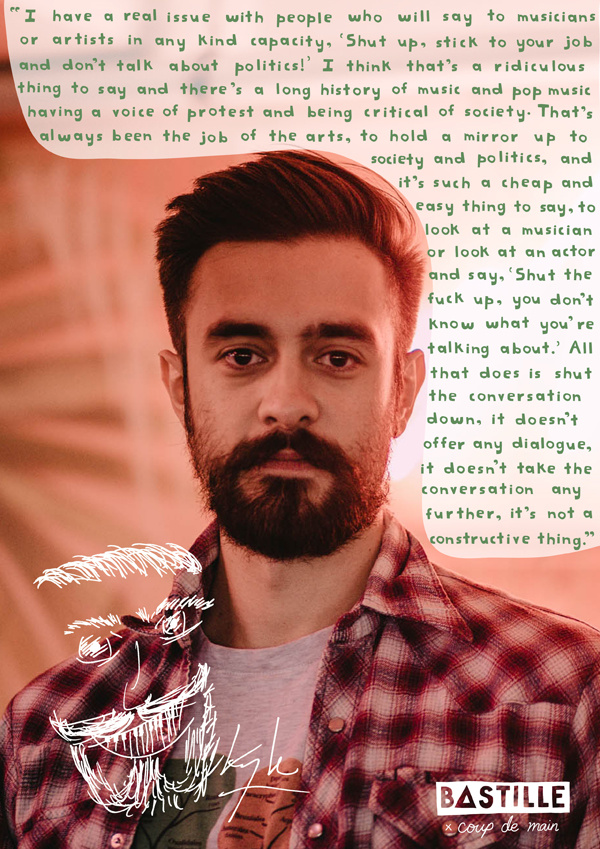
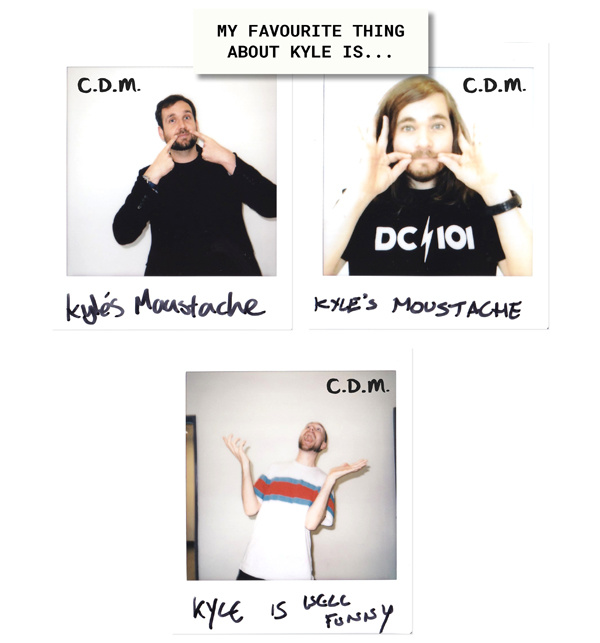
CDM: 'Bad Decisions' has such an 'all or nothing' vibe. Do you relate to that or are you more of an over-thinker?
DAN: I’m definitely an over-thinker on absolutely everything, but I think with that song, a bit like a lot of the album, we wanted it to work on a few different levels. On one level it’s about that stage at the end of a relationship where you both openly admit that you’ve both sort of fucked it completely, but there’s still parts of it and parts of each other that you enjoy and don’t want to let go of. It’s just about owning the fuck-ups and the bad decisions that you’ve made and wanting to keep things going just that little bit longer through the night, even though you know it’s not good for either of you. It’s also kind of about Britain at the moment - it feels like we’ve made one big national bad decision, in our opinion. I guess globally it feels like these weird times where people have very strong opinions on things, and part of being in a democracy means that huge national decisions are made that almost 50% of the population completely oppose and disagree with. And no matter which side of it you fall on, ultimately you’ve got to live the consequences. So I wanted that song to be this sort of Daft Punk-esque, sort of 'balls out' song about fucking up and owning it. I wanted it to set this apocalyptic tone. If 'Quarter Past Midnight' was the point of throwing yourself blindly into the night, 'Bad Decisions' was the more conscious other side of that.
CDM: In 'The Waves' you say, "We'll never, never give up on the lost boy life." We were talking to Ezra Koenig from Vampire Weekend recently who wondered if the age of 40 is now the definition of youth by some people's standards. Why do you think it is that now, more than ever, there is such a reluctance to grow up?
DAN: Very good question! I have no idea. <laughs> Maybe the things that embodied youth culture in an age gone by have just become the things that people want to do all the time. I think the internet allows us to have access to and do a lot of the things we want to do for so much longer. Just going back a chunk of time, video games were aimed at kids, and you look at them now and it’s one of the biggest entertainment industries in the world. I think that maybe that embodies something about something in a time gone by that was seen as just for children, and now it’s this highly intelligent, sophisticated, multi-billion dollar industry. I don’t know, I’m not a gamer so this isn’t coming from a place of like-- <laughs>
CDM: I just bought a Nintendo Switch last year, so I am a partial gamer. It is so great, I highly recommend it.
DAN: Check you out! Maybe people are just loosening up in some senses and being more open to being less uptight. Maybe in older generations, the idea of growing old and being old meant being serious and maybe giving up some of the things that are enjoyable or fun or interesting. Maybe I’m generalising, I’m not quite sure. But I think people nowadays probably feel more able to change their life up, and less have to stick to pre-defined rules of what people thought an adult should be or a person should be - I think categories more and more feel less important and less relevant, and maybe that sort of seeps into age in some way as well.
CDM: “Why would we divide when we could come together?” from 'Divide' is a really powerful uniting statement, which I think can be applied to such a big level of humanity. What do you think can be done to encourage more feelings of unity in the world?
DAN: I think the most important thing is just encouraging people to actually talk and listen to each other, no matter what that is - if it’s an argument at school, or at work, or something on the internet, or someone who just has really opposing views to you. It seems that we’re at this point where people disagree so violently and make assumptions and choose whatever they want to believe and are so able to shut off to and completely ignore the opposing opinion or opposing facts that don’t support what they’re thinking. The fact that whatever you believe, you can find people that support your opinions, be they totally justified, or be they completely unfounded and out there and whacky-- it’s interesting to see this mainstreaming of conspiracy theorists who just a few years ago were seen as totally fringe and absolutely insane.
CDM: Have you seen the flat Earth documentary on Netflix?
DAN: Yeah I have. I mean, look at that! There’s a lot to unpack in that. <laughs>
CDM: The lead guy just came to New Zealand over the weekend and he was doing all these interviews with radio, it was very interesting to see.
DAN: No way! How were the journalists treating him?
CDM: The radio people were kind of mocking him, but in a way that he kind of enjoyed.
DAN: Yeah. I think the thing that was really interesting for me in that was how much he was enjoying--
CDM: I think he’s just a really big narcissist as well.
DAN: Yeah, I think he was just loving the attention, I don’t think he gives a shit, I don’t think he really cared what people thought of him, it was more just that he was getting airtime, and people to listen to him. I think that’s almost a really neat example of what the internet and corners of the internet offer. People who maybe in their daily lives aren’t listened to that much are allowed this platform where they can say things and provoke and get reactions and hold people’s attention. It’s interesting that that’s the place that we’re in.
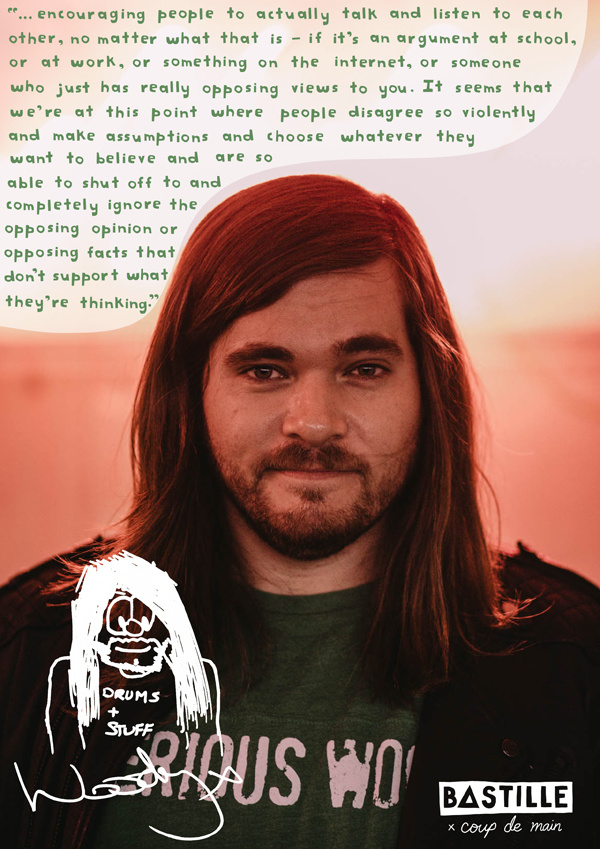
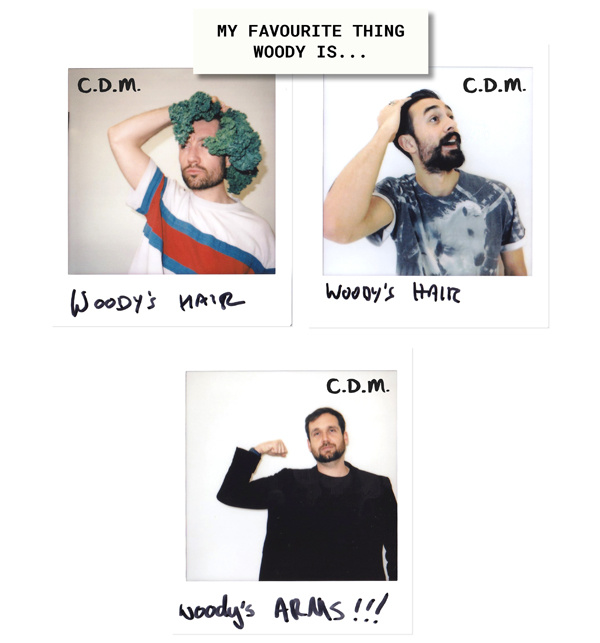
CDM: Are you referring to sensationalist news reporting and media coverage with the lyric "glamourise the chaos"?
DAN: Totally! I think with ‘Divide’ I wanted it to feel really personal, but also sort of speak to bigger things. That’s exactly what I was trying to do in that.
CDM: Who sings the female vocal line "we’re running away" on 'The Waves'? What made you want to have another voice on that song?
DAN: There’s actually a couple of people in there - there’s a singer called Kianja, who is an upcoming artist and actually is releasing music right now on Best Laid Plans, which is the label that I help run. She’s this amazing 19-year-old singer from London who I’m a huge fan of - she sang the backing vocals on 'Quarter Past Midnight' and also on 'The Waves'. So she sings the high bit, and then the sort of intro bit and outro bit and the gospel chorus is this woman called Bim who also sings on ‘Joy’, and she was part of the choir who sang with us on our ‘ReOrchestrated’ tour. Because we made this album in our studio in London which is also the home of our label, and it’s got a few rooms, there are always people wandering in and out. We have Rationale, we had Kianja, we had The Dawn Of May, we had various different people who were coming through the studio and using the different rooms to write and record, and we wanted them to lend their voices to the record to give a bit of different texture. On previous Bastille records I’ve always done all the backing vocals myself, so it’s kind of just been a big layer of me, and I think that definitely made it stand out and made our sound a bit more distinct, but on this record because it’s this night out, we wanted it to be this sort of slightly raucous ever-changing party feel. I think it was important to have different voices, and so you almost feel that the cast of characters is wandering in and out of the story.
CDM: It feels like different characters in a way, all being part of the story.
DAN: I wanted the choir elements to be like, ‘Are they your sub-conscience? Are they different people in the story? Are they the chorus? Literally, the Greek chorus helping tell the story?’ I just wanted it to be that sense of community, and it being a place and a night that’s populated by many people, rather than just the protagonist or a couple of central characters. Also, these are just people I’m huge fans of, and on a really basic level I just love their voices and we felt very lucky that they were even up for singing on our record. It was an amazing privilege to have that. With some of the gospel elements throughout the record, we finished what we thought was gonna be the album and then we did the ‘ReOrchestrated’ tour, and after touring and playing every night with these amazing musicians and these singers, like Rittipo the saxophonist, we just finished the tour thinking, 'Fuck! There are so many different layers that we can add to this record if we just open up our process a little bit and bring a few other people in.' I think it hopefully helps elevate those songs to places where our brains musically would never have gone to. It’s been really fun.
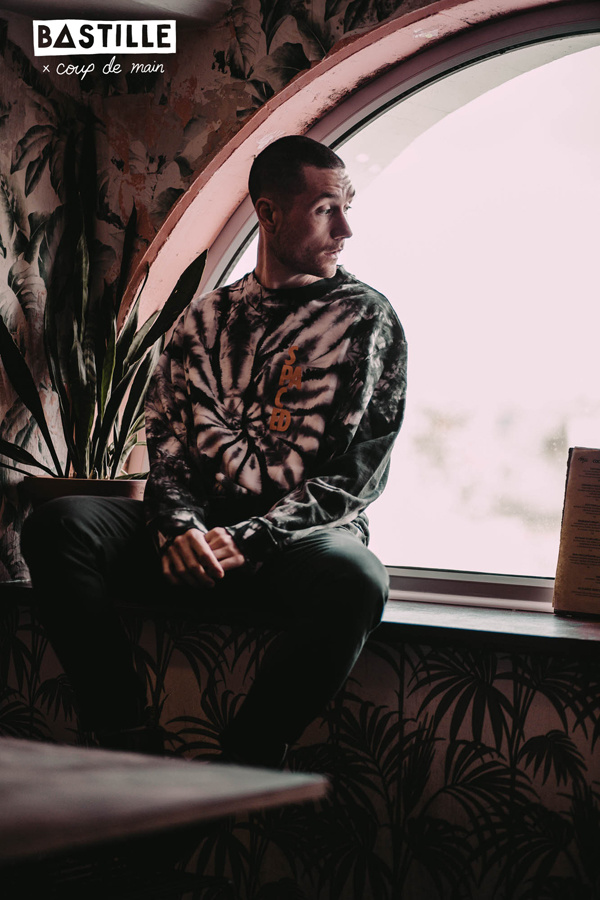
CDM: I love how you are super vocal on social media about music and pop culture you’re enjoying which is really nice to see. Did you listen to or consume a lot of other media when you were making the album?
DAN: I find for me that I’m always writing, and I go into modes where it completely takes over all of my headspace to the point where if I’ve got a few songs on the go in the back of my head, I could be in the cinema and have to leave to go and sing something into my phone. It’s super annoying! I embarrass myself singing in a corridor and then I come back in and have to bother whomever I’m with, like, ‘What just happened?’ Then sometimes I’m not in that mode and it’s much more chill. But I feel like I constantly want to be listening to new music, and old music, and watching films, and reading a lot because it can be distracting, but it can be inspiring. I’m just not someone who’s going to want to talk about the meal I just had or how I’m particularly feeling, so my relationship with social media has always been sort of focused around our band and then other stuff that I love because I feel much more comfortable passionately talking about it.
CDM: It’s nice, it kind of makes a sort of mutual enthusiasm with your fans. When you post a new Lana Del Rey song, there are Bastille fans excited, that are also Lana fans!
DAN: It’s quite cool to have that connection with them because it’s about finding things that you have in common rather than your differences.
CDM: Some people view social media as a way to fight other people.
DAN: That’s the thing! I think it’s really interesting that it’s so combative for some people, and I’m not someone who wants to be outwardly confrontational. There’s such a dark side to social media because everybody has weird and bad thoughts, but you filter them and don’t say them out loud. But as soon as you have the mask and the privacy and the ability to be able to type anonymously and the invisibility cloak of anonymity, it just brings out the worst in people. And those really awful dark self-consciousnesses can all find each other and agree with each other online and exist in these dark pockets and corners. I guess that’s where the whole idea of trolling as a passion might have started from, but who the fuck knows. For me, there’s enough shit in the world to not go on the internet and be an asshole to other people. What’s the fucking point? That’s my opinion. I always get really excited if I hear a song that I love or there’s an album I’m excited about, or I see a trailer or watch a film, and I want to shout about it. It’s always been a space for me to just preach about music that I love.
CDM: You’ve told fans that ‘4AM’ is your favourite song from the new album. Why is it so important to you?
DAN: Interesting - I don’t remember saying that! It’s one of my favourites. I think I just wanted to make something that was kind of a love letter to my mates and to the people around you that are really important, but it’s told through the eyes of a pretty out-of-it 4am perspective, so it’s got this weird, dark slightly fucked up undertone - you’re in the dying embers of a party and it’s the late stayers, and at that moment, in that snapshot you feel so happy and comfortable with the people who are there, even if in twelve hours time you might feel disgusted by the whole thing. <laughs> There’s something quite pure about the sort of naivety of that, which is even more ironic because it’s in such an un-pure scenario. On one level it’s that, but also I think the second half of the album for me, everything before ‘Doom Days’ is potentially quite cynical and looks to bigger issues we’ve kind of talked about up to now, and at the end of 'Doom Days' when it talks about putting your phone down and falling into the night, everything from there on in the album is much more about human connections, and about enjoying the people around you and trying to be more present in the situations you’re in, and about unplugging. It really happens on a big night out, it allows for meeting loads of new people, having big, stupid, deep, superficial conversations with people that you see all the time, or someone that you’ve never met before and you speak to for five hours. I think it’s just such an interesting space. When you think of nights out, apart from maybe people taking loads of photos of each other, it’s generally an interpersonal, offline space as well. So I really wanted the album to move in that direction from the halfway point 'Doom Days' onwards.
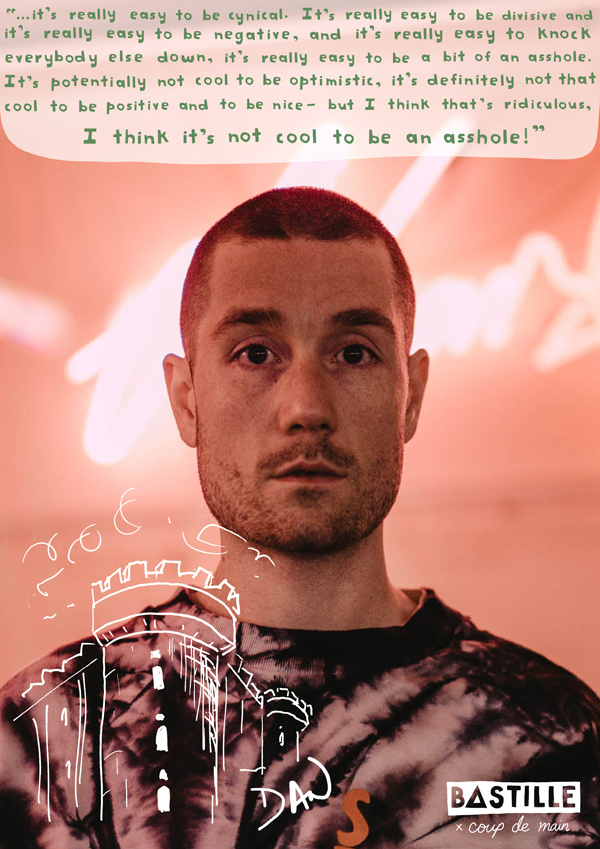
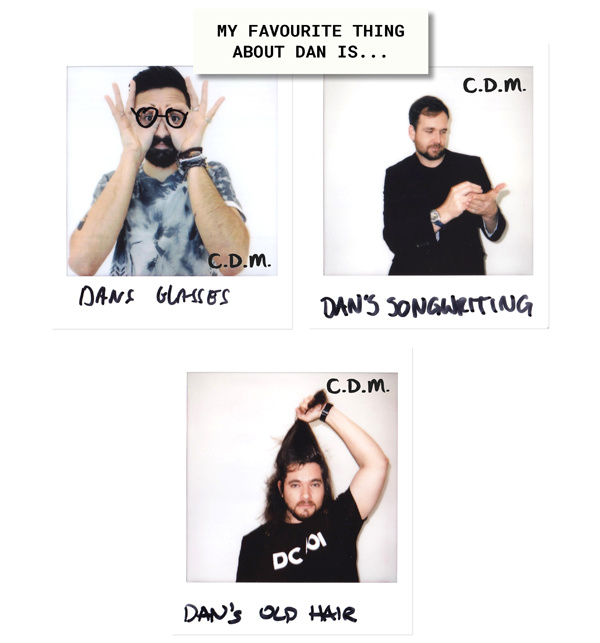
CDM: You sang about 4am on ‘Winter Of Our Youth’ (from 'Wild World') singing, “It's 4am here comes the fear,” but in ‘4AM’ you seem more comfortable in your surroundings and the people in them. What’s changed for you?
DAN: Good question! I don’t know, maybe I have had more positive 4am experiences since then.
CDM: That’s good to hear!
DAN: If ‘Winter Of Our Youth’ is about feeling reluctant of growing up and accepting being grown up, maybe this album is about being more comfortable in your situation and owning it a bit more.
CDM: The instrumental parts in ‘4AM’ are so cool. Was it fun to experiment with the horns section?
DAN: Oh, it was brilliant! It’s Rittipo the saxophonist, he’s toured with us for a few years and he’s a really good friend. He’s just an incredible musician, he’s one of those guys who can play everything. We had him with us on the ‘ReOrchestrated’ tour, and after going back into work on the album, it was a no-brainer to get him in. I love Bon Iver and his use of saxophone across his albums and I wanted to draw a little bit of that into it and just basically asked Rittipo to let rip, and in ‘Those Nights’ it’s like an orchestra of saxophones layered and layered and layered. His musical sensibility is so wide-ranging, there’s so much jazz and experimentation in there that is not in my musical brain at all, so I just wanted him to bring as much of that as possible to the songs. That’s part of trying to push what we do forward a little bit - bringing other people’s perspectives into what we’re making. For me, whenever I have to work on or listen to our tunes, I almost don’t hear my vocals, I kind of delete that because I just get obsessed with the production that we’re making. So one of my favourite bits of a record is always other people’s moments - I love Kianja in ‘The Waves’, and I love Bim and all her vocals on ‘Joy’, and I love all of Rittipo’s stuff and I love the gospel singers at the end of 'Those Nights'. Those are the moments for me that are really special because I can enjoy them more because it’s me just being excited by other people’s sounds and me being really proud of my friends.
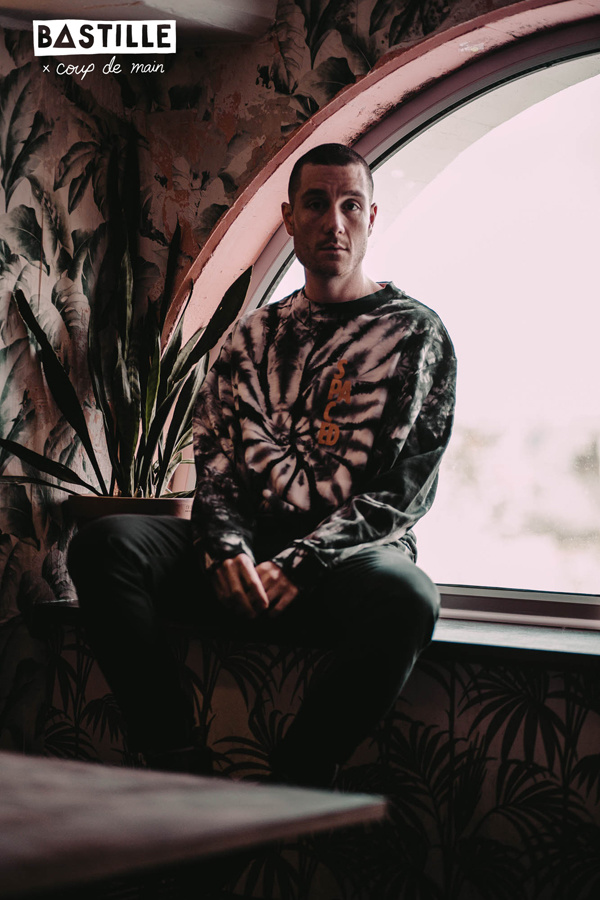
CDM: Is there a reason why the very end of '4AM' has a bit of a snippet of you singing a line from ‘Quarter Past Midnight’?
DAN: Yeah! That bit at the end actually was when I was sitting in my house with a bunch of my friends around, and I’m not the guy that sits in a house playing music ever, I’m not the kind that picks up a guitar at a party--
CDM: "Here’s 'Wonderwall' by Oasis!"
DAN: <laughs> Fuck that! That makes me cringe so hard. But for some reason, we were sitting around catching up, me and a few mates, and I think I had this idea for a keyboard line so I was just sitting there with this little toy keyboard and I was recording it. I think I was trying to do it subtly, I was recording a voice note of this keyboard line because I thought it would be good for ‘4AM’ and my friends were just chatting away in the background. I took that into Mark [Crew] and was like, "I think we should do this as an outro for '4AM'," and he was like well, "Dude, let’s just use that bit!" I love the idea of having all these voices weave in and out of the album and feeling a bit rough around the edges. I also love the refrain of, "I can’t remember / I can’t remember," and having that weave throughout the album just adds to the sort of woozy, narrative sense of memory loss and inebriation, and how the course of a night out can feel like three minutes and it can also feel like three years - so much can happen and so little can happen. The feelings of time passing can constrict and stretch out, and I think we wanted that to be a thing sort of woven throughout.
CDM: I also like it because when I first listened to ‘4AM’ I didn’t pick up on it, but it was on my second listen when I heard it. So I feel like your fans will pick up on things as they listen to it over and over, which I really like about an album, where you hear something new about it each time.
DAN: Thank you. I hope so. We try to weave in quite a lot of references and intertextual elements, and have phrases pop up in different songs, and for the whole thing to feel interconnected. It was really important to us that it felt like a cohesive album. We wanted to try lots of different sounds and have lots of different voices on the record and have it really feel like this night out. I think it does take you to quite a lot of different textures and sounds and ideas, but we wanted it to also feel really cohesive and feel like it’s all from the same set because it was, it was the first time ever we made a record in one go and in one place. We had such an amazing time doing it, we just wanted that to come through in the listening experience. So hopefully if people give it the time to listen to it through once, or even twice, hopefully, they’ll pick up on a bunch of that stuff.
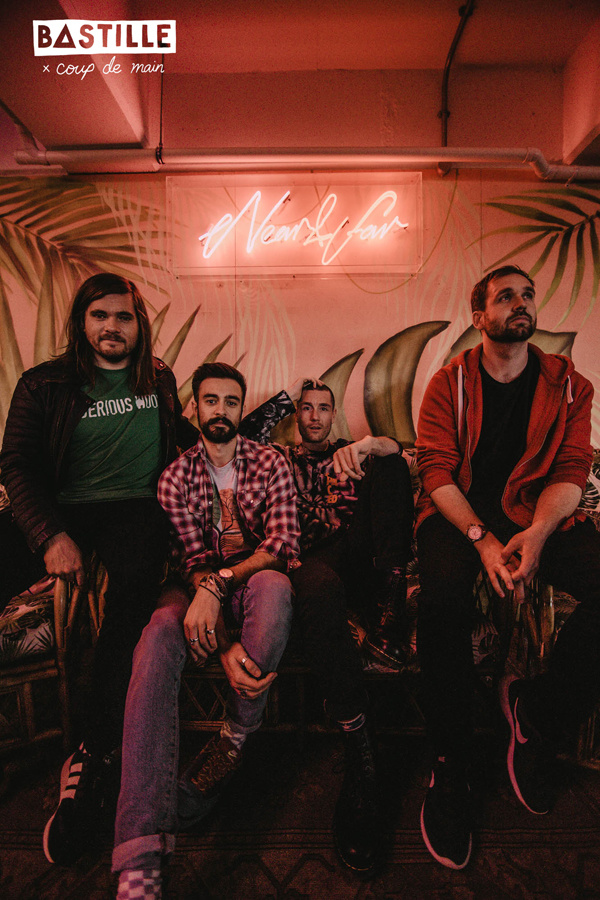
CDM: I saw that you had a student radio show when you were back in university. Would you ever want to do a Bastille radio show?
DAN: Kyle used to do student radio as well.
KYLE: I’d like to do radio in general.
BASTILLE - WILL FARQUARSON: I think it would be fun for us, but I don’t know if anyone would listen to it. But it would be a nice thing for us, for sure, because we like talking about music we like and the stuff that we enjoy.
DAN: We wanted to do ‘Other People’s Heartache’ radio based on our mixtape. We unfortunately just weren’t able to make it happen, but I had the idea of for every track on the mixtape, interviewing the people who were on the track, playing the original track, and talking about the idea of covers and different versions of songs and stuff. I definitely personally feel more comfortable talking about other people’s stuff than our own.
CDM: I have a bone to pick... that you guys have only ever been to New Zealand once to play Rhythm & Vines Festival, which was a very long time ago, but you’ve never been to play your own actual show! Do you think that will happen eventually?
KYLE: Yeah, definitely. So when we come over to this side of the world properly - it’s really difficult because, with this one, this was like the seventh reschedule because things kept happening for whatever reason - we’re gonna do a proper tour over here and Asia and hit New Zealand properly. It was so nice to visit there last time and we definitely want to spend more time there, and do our own shows and see what the response is.
BASTILLE - CHRIS WOOD: We can only apologise for having taken so long to come back again! It’s definitely on our list to do, we promise.
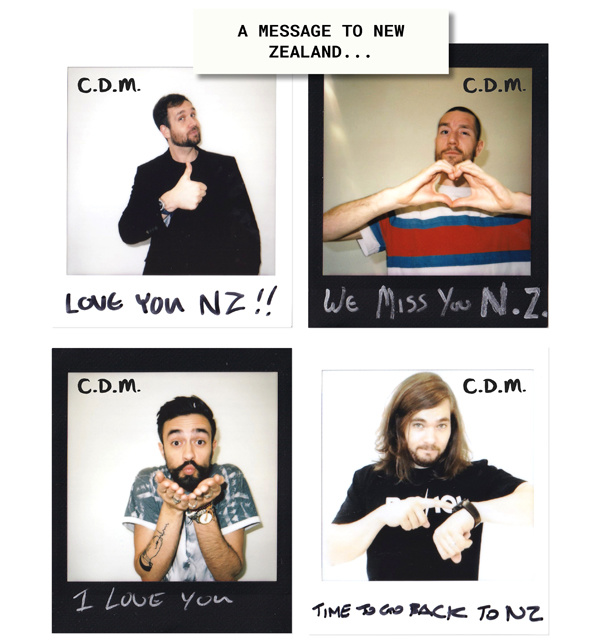
CDM: To end on a slightly happier note, in 'Those Nights', Dan you sing, "Looking for a bit of hope these days." Why do you think that in dark times, finding hope is really important?
DAN: Because it’s really easy to be cynical. It’s really easy to be divisive and it’s really easy to be negative, and it’s really easy to knock everybody else down, it’s really easy to be a bit of an asshole. It’s potentially not cool to be optimistic, it’s definitely not that cool to be positive and to be nice - but I think that’s ridiculous, I think it’s not cool to be an asshole! <laughs> I like to use our social media to talk about stuff that I love, I like to big up songs and films and artists that I think are amazing - I don’t see it as a space where I want to bitch and moan about stuff. There are enough people doing that. It’s ridiculous of me that I don’t want to come across as some sort of super worthy, overly positive guy, because I’m not at all. Our music has a lot of darkness and anxiety in it, but I also think it’s important that there’s a glimmer of hope and optimism in everything so it doesn’t get too self-serious or bogged down in any of that stuff. I think the perception of our music is probably that it’s a lot more serious that it actually is, because my voice is my voice, it sounds like everything is heartbreak, but it’s not! There’s probably quite a lot more piss-taking in our music than we maybe get credit for. Our most famous song ['Pompeii'] is about two ashy corpses who are bored out of their minds, frozen in the same position for hundreds of years! That was never meant to be super serious.
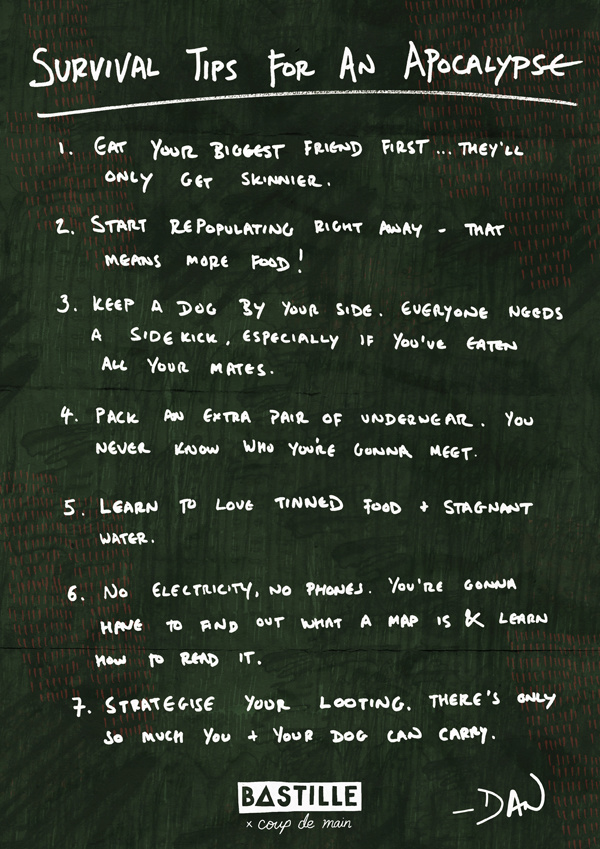
Bastille’s album ‘Doom Days’ is out June 14 - click here to pre-order, plus watch the ‘Doom Days’ music video below…

